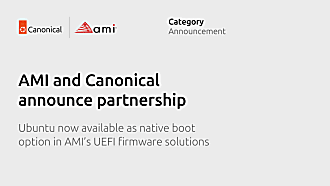Rebecca Cradick
on 2 February 2016
Sanjay Sinha from Oracle on Cloud adoption and working with Canonical

Sanjay Sinha, Vice President of Platform Products at Oracle speaks to Alexander Gallagher, Business Development for Canonical’s Certified Public Cloud on the drivers behind cloud adoption.
Alexander: What do you think are the biggest barriers facing enterprises when it comes to cloud adoption?
Sanjay: The barriers have been coming down and we have seen rapid adoption of our Cloud offerings. Enterprises typically express concern over security, data residency, regulatory compliance, and how to integrate on-premise with cloud for a hybrid model. In addition, enterprises have a long tail of on-premise applications in their datacenters that they would like to move to cloud, but that effort will be a decade long transition. Enterprises do not want to rewrite nor incur additional IT costs in their migration to the cloud, and they are coming to Oracle as their strategic provider today.
Alexander: Last week it was announced that Canonical and Oracle had expanded its partnership and would be providing Ubuntu Certified Images in Oracle Marketplace. How do you think our partnership will help remove these barriers?
Sanjay: Our relationship with Canonical optimizes Ubuntu for the Oracle Cloud Platform, both public cloud and on premise. This is available today in the Oracle Cloud Marketplace. With Ubuntu, we bring a very popular cloud OS to users of the Oracle Cloud Platform for enterprise application development, cloud-native DevOps, and the open source applications ecosystem.
Alexander: How do you think the needs of the enterprise are changing and how are you responding?
Sanjay: Enterprises are adopting a “cloud-first” strategy and agile methodologies for new application development. This strategy enables them to compress their DevOps cycles, which gives them business agility and competitive advantage. We are also seeing enterprises shifting from a CAPEX model to an OPEX economics. New employees coming into enterprises have different expectations for how they work and interact.
However, the need for security and compliance is not changing. To respond to the changing landscape, Oracle provides the same user experience on the Oracle Cloud enterprises require, now running Ubuntu based applications. We offer Elastic Compute and pricing for dynamic workloads with short start/stop cycles to fit into OPEX budgets. Oracle Public Cloud is the platform designed for extensibility that allows line-of-business (LOB) developers to go directly to the cloud for agility. In the same manner, Oracle enables IT organizations to use the same cloud infrastructure to gain agility to meet LOB requirements.
Alexander: Where do you see the evolution of cloud computing going?
Sanjay: Dev/Test was the first mover to the Cloud, but the majority of the production workloads are still on-premise. We see migration of Oracle technology workloads to our optimized Platform as a Service, and non-Oracle technology fitting well into our Infrastructure as a Service. We see an integrated stack i.e., SaaS + PaaS + IaaS. Our strategy is to offer a software defined virtual datacenter in the cloud, to give customers control and choice.
Cloud computing has great appeal for the elastic nature of the infrastructure, but it is imperative to offer predictability of performance in addition to elasticity. The volume and velocity of information generated will continue to drive Big Data and Analytics to turn insights into actions.
Enterprises also need to adapt to the Millennial Generation in the workforce, with greater emphasis on mobile and social networking.
Alexander: What role does open source play in Oracle’s future?
Sanjay: Open source will bring the latest and greatest OS innovations to enterprise customers who want to build applications leveraging the most popular technology. More enterprises will be adopting an open source strategy and will want to run open source apps on the Oracle Cloud. For example, many popular applications built on open source technologies can be integrated today with the Oracle Database Cloud Service.
DevOps in the Cloud, uses a lot of open source tools and they are innovating how new breed of applications are developed, deployed, and used. We see open source applications running alongside cloud services and traditional enterprise apps running on the cloud. Oracle Cloud provides the flexible platform for running any of these customer workloads.
Alexander: Why is it important for Oracle Cloud to be using Certified Images for Ubuntu?
Sanjay: Certified Ubuntu images fit into the Oracle Cloud Marketplace model so Canonical can provide support, security, and stability. It is optimised for the Oracle Cloud and provides the best experience of Ubuntu on Oracle Cloud Platform (IaaS) for our mutual customers, giving them the confidence of running their business critical applications on Ubuntu and Oracle.
Alexander: What, in your opinion, will the typical on-premise Oracle customer do differently in the cloud, in terms of technology and operational choices?
Sanjay: We believe that DevOps will become increasingly important in the cloud, with more continuous integration and delivery, in a faster cycle-time. The great majority of existing enterprise applications will be interconnected and integrated i.e., integration in the cloud with 3rd party applications, custom applications, and data sources. New apps and new innovations will be cloud-native. Enterprises will look to migrate their entire datacenter to the cloud in a phased manner for agility and cost management, without being disruptive or forcing re-writes.
Hybrid Cloud, which is the integration of corporate data centers with the public cloud, will be the prevailing operating choice for the majority of our customers for quite some time. Oracle’s Network Cloud Services support a variety of technologies for Hybrid Cloud, such as VPN, Direct Connect, and Cloud Exchange.
Finally, we believe that high availability and disaster recovery will remain very important. Data residency and compliance will be a priority for IT and corporate governance. Supporting heterogeneous guest operating systems and technology stacks is an important part of supporting migration to the cloud without disruption.
The try Ubuntu on Oracle Cloud sign-up for a free trial ›



